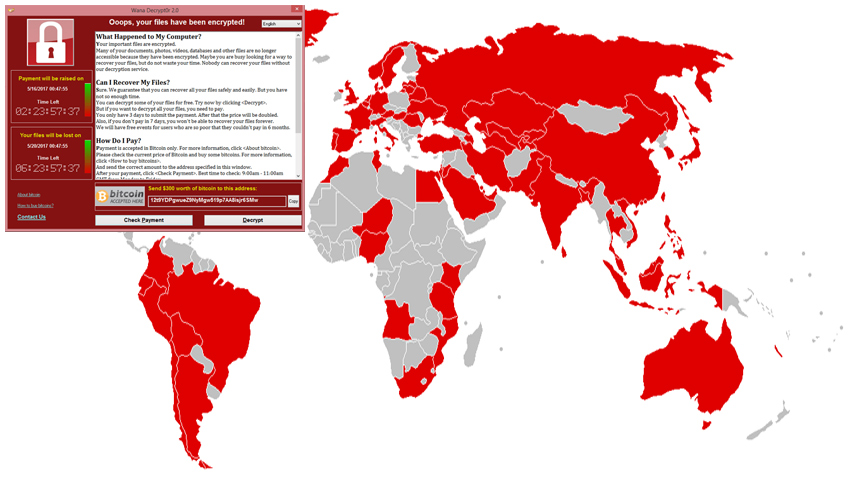It would be next to impossible to find even one internet user who has never been the target of cyber-attack. Of this, cyber security experts have no doubt whatsoever. They say that there are two kinds of people and companies – the kind that know they have been targeted, and the kind that never find out they have. In other words – in our day, everyone is getting hacked.
Efforts are now being focused on an adequate formulation of the different kinds and types of attacks and the reaction by the people hacked. The latest notorious virus was WannaCry which encrypted all files and IT systems on the computer infected, demanding a ransom of 300 dollars to restore access. The odd thing was that in this case, money obviously was not the objective, because even when the ransom was paid, the users were not given a key to unlock their IT system, cyber-security experts say. But what made this attack so extraordinary was the speed at which it spread around the world, illustrating the fact that the pace of technological change really has made a global village out of this world, in which all IT systems are connected. A simple virus like WannaCry showed us that if tomorrow there were to be another, more advanced attack, it could spell disaster for the economy and users would be unprepared and would not know how to react.

To raise awareness and help keep Bulgarians informed on cyber-attacks, the State e-Government Agency launched a national cyber-hygiene campaign “They will not hack me”. The campaign, under the patronage of European Commissioner for Digital Economy and Society Mariya Gabriel, will run through the Bulgarian Presidency of the Council of the EU until mid-2018.
The public campaign aims to reach out to as many Internet users in Bulgaria as possible. According to National Statistical Institute data for 2017, almost 62 percent of Bulgarians use the Internet regularly, and over 67 percent of households have high-speed broadband. That is one advantage that the “They will not hack me” campaign has – that it is taking place primarily online which means it consumes a minimum of financial and human resources. The campaign’s main aim is to popularize simple but effective rules of cyber-hygiene capable of reducing the risks to any member of the public and hence – to organizations in the public sector and to businesses, which are at risk most when online.
“Of course, it is not possible to be protected to such an extent that you will never be targeted by hackers, because attacks nowadays are very advanced and sophisticated,” says Iva Nedelcheva, expert at the State e-Government Agency. “The best protected systems can be infiltrated. The idea of the campaign is not to promise that we shall not be hacked, it is to focus on elementary cyber-hygiene habits. Any information we share digitally is vulnerable. Just as we try to protect our identity in the real world – our wallet, our bag, how much information we give out and where – we must act exactly the same way online. We should know there is someone somewhere watching us and we must be very aware of the choice of websites we make, or when we search for a film or a song we can’t find. That will take us to websites whose origin is unclear. The most important thing when we surf the Internet is to see whether the website has a security certificate. Not that this will mean we are 100 percent protected, but it does give a guarantee that someone has made the efforts to protect us.”
“There are websites that help us realize the complexity of the encryption used for the cyber-theft,” says Dinela Kaitazka, also an expert at the State e-Government Agency. She says that before seeking help, you should make sure you are not the target of a fake cyber-attack, because that is something you can ward off by your own effort, by reading up on the subject.
English version: Milena Daynova
NATO tests new 'no U.S.' mission model in Balkans NATO is testing its ability to deploy rapidly across Eastern Europe - without direct US support - as Washington shifts its approach to European defence and the war in Ukraine, the Associated Press..
Love blooms with renewed vigour every year on 14 February! Valentine's Day is increasingly being celebrated in Bulgaria as a holiday that inspires lovers to share beautiful moments together. Traditions include the exchange of cards, gifts and romantic..
From February 14 to 16, an event under the motto "Love and Wine" will allow Sofia residents and guests of the city to combine the Bulgarian holiday of wine Trifon Zarezan with Valentine's Day. It will be held on the pedestrian zone..
The Martenitsa Festival was held in Brussels f or the third consecutive year . Cultural organizations from Bulgaria, Romania and Moldova presented their..
Exactly 3 years ago, on February 24, Russia’s invasion of Ukraine began – an event that woke up Europe 77 years after the end of World War II and called..

+359 2 9336 661
